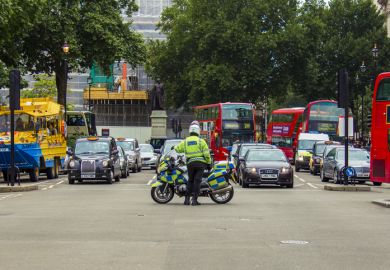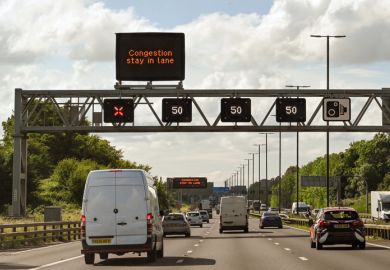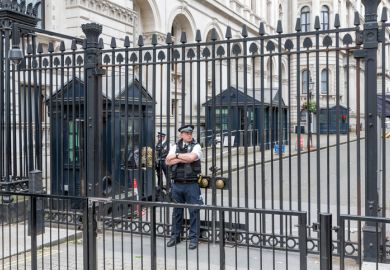Ministers’ plans to set a minimum entry requirement for English higher education would bar half of all pupils eligible for free school meals in London from accessing public funding, the Westminster government will be warned.
A consultation that runs until 6 May asks for views on the introduction of a minimum entry requirement (MER) to qualify for student loans at higher education institutions and a possible system of student number controls (SNCs), as part of the government’s much-delayed response to the Augar review of post-18 education.
Universities UK is expected to strongly oppose SNCs as “a cap on aspiration” hurting those from disadvantaged backgrounds and to highlight the negative impact MERs would have.
On an MER, the government consultation will consider whether a GCSE grade 4 in English and mathematics, seen as a pass, is “the appropriate threshold”. Higher education minister Michelle Donelan has said that fewer than 5,000 current students entered university with worse grades.
But London Higher, representing institutions in the capital, has carried out analysis that shows that an MER set at GCSE English and maths grade 4 would, in London, lock out 49.4 per cent of free school meal-eligible pupils, 40.1 per cent of black pupils and 86.1 per cent of pupils with special educational needs.
The government consultation proposes an “alternative option” to set an MER using A-level and equivalent qualifications, at a level below that of three D grades.
Research by London Higher’s AccessHE division “also shows that if MERs were to be set at A level, this would disproportionately affect London’s black African, black Caribbean, Bangladeshi and Pakistani students, who are most likely to hold at least one ‘E’ grade”, said Diana Beech, the organisation’s chief executive and a former policy adviser to Conservative universities ministers.
Highlighting Institute for Fiscal Studies (IFS) research showing the particular success of London universities in taking high numbers of disadvantaged pupils and sending them on to high-earning jobs, Dr Beech said that any form of SNCs or MERs “will be sure to reverse progress on this astounding social mobility success story”.
Rachel Hewitt, chief executive of the MillionPlus association of modern universities, said that it was “fundamentally opposed to minimum entry requirements, which are against the core principles of inclusion, aspiration and the power of education”, and were “likely to be unworkable, due to the number of exemptions that would need to be taken into account, for example for students with special educational needs”.
Andy Westwood, professor of government practice at the University of Manchester and a former adviser on universities in the Labour government, said that he would “expect those [institutions] likely to be most affected to lead the response on MERs”, but that it was likely “everyone will be against SNCs – especially without clarity of how a policy might be designed [or] implemented”, because “the majority of institutions could easily be affected in some way, whether intended or unintended”.
The interventions came as separate research from the IFS says that, on an England-wide level, about 10 per cent of students from the 2011 and 2012 GCSE cohorts who went on to university did not achieve a grade 4 in English and mathematics.
Significantly, the research – published on 27 April – finds that almost one in four free school meal-eligible pupils would fall short of this MER threshold, compared with only 9 per cent of other state school students.
Nearly a quarter of black students (23 per cent) would be excluded from higher education, and nearly one in five (18 per cent) of Bangladeshi and Pakistani students, compared with only 7 per cent of white students and about 10 per cent of Chinese and Indian students.
The IFS research says that those who do not meet the suggested GCSE or A-level requirements are just over 10 per cent less likely to complete their degree than students meeting both thresholds. However, the vast majority – about 80 per cent – still manage to complete their courses.
And it highlights that larger proportions of students on certain courses would be excluded, including social work and creative arts courses – degrees with low earnings returns – but also more lucrative programmes, such as computer science and business. Other subjects with comparatively low earnings returns, such as history and languages, would barely be affected.
The IFS research concludes: “If the government’s aim is indeed to prevent students from going to university who not are not equipped to benefit from degree study, it is not clear that the MER proposed would achieve this – or at least it might do so but only at the cost of excluding many who would experience good degree outcomes.”
A concurrent consultation is seeking views on the introduction of a lifelong loan entitlement (LLE), which would allow adults to borrow funding for the equivalent of four years of post-18 education over their lifetime.
The Russell Group is pushing for the loans to cover master’s level qualifications, but other universities want the scheme to focus on degree and sub-degree provision, fearing that including postgraduate courses could reduce the resources available to institutions that are not research-intensive.
A Russell Group spokesman said that it “would encourage the government to look at including Level 7 modules or courses as part of the LLE, which would help meet the growing need for master’s-level skills and deliver excellent returns for graduates and the exchequer”.
Register to continue
Why register?
- Registration is free and only takes a moment
- Once registered, you can read 3 articles a month
- Sign up for our newsletter
Subscribe
Or subscribe for unlimited access to:
- Unlimited access to news, views, insights & reviews
- Digital editions
- Digital access to THE’s university and college rankings analysis
Already registered or a current subscriber?








